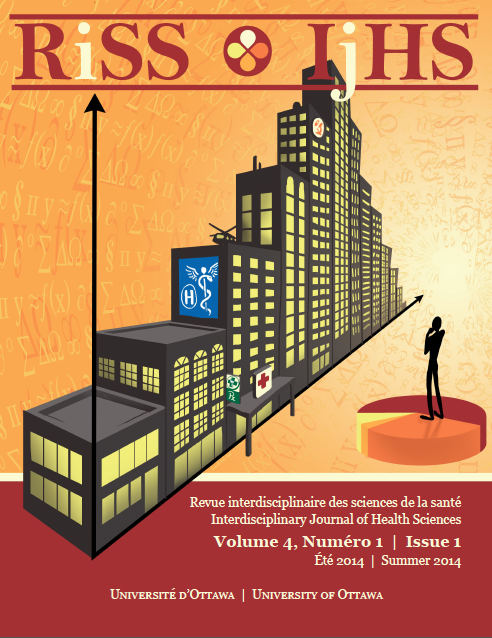Health Sciences (HSS) Buddy Program: Evaluation of its First Year
DOI:
https://doi.org/10.18192/riss-ijhs.v4i1.1222Keywords:
Mentorship, university students, pilot study, depression, peer support, school stress, academia, educationAbstract
In the 2011-2012 academic year, the HSS Buddy Program pilot project was implemented in the Interdisciplinary School of Health Sciences at the University of Ottawa. Intended to address rising student anxiety levels, the program teamed freshmen (first year) students with groups of older students to promote more instances of casual social interaction. Participants’ perceptions of the program were universally positive in terms of how enjoyable it was, its usefulness, and its relevance to student needs. Suggested improvements include recruiting of more male participants, liaising with school administrators to help avoid scheduling conflicts, starting the program earlier in the academic year, and forming social groups with fewer students. Overall, the approach undertaken by the Buddy Program was seen to be a valuable one worthy of continuation and growth.
References
DuBois, D. L., Holloway, B. E., Valentine, J. C., & Cooper, H. (2002). Effectiveness of mentoring programs for youth: A meta-analytic review. American Journal of Community Psychology, 30(2), 157-197. doi: 10.1023/A:1014628810714
DuBois, D. L., & Neville, H. A. (1997). Youth mentoring: Investigation of relationship characteristics and perceived benefits. Journal of Community Psychology, 25(3), 227-234. doi: 10.1002/(SICI)1520-6629(199705)25:3<227::AID-JCOP1>3.0.CO;2-T
Good, G. E., Dell, D. M., & Mintz, L. B. (1989). Male role and gender role conflict: Relations to help seeking in men. Journal of Counseling Psychology, 36(3), 295-300. doi: 10.1037/0022-0167.36.3.295
Grossman, J. B., & Rhodes, J. E. (2002). The test of time: Predictors and effects of duration in youth mentoring relationships. American Journal of Community Psychology, 30 (2), 199-219. doi: 10.1023/A:1014680827552
Grossman, J. B., & Tierney, J. P. (1998). Does mentoring work? An impact study of the Big Brothers Big Sisters program. Evaluation review, 22(3), 403-426. doi: 10.1177/0193841X9802200304
Patton, G. C., Bond, L., Carlin, J. B., Thomas, L., Butler, H., Glover, S., ... & Bowes, G. (2006). Promoting social inclusion in schools: A group-randomized trial of effects on student health risk behavior and well-being. American Journal of Public Health, 96(9), 1582-1587. doi: 10.2105/AJPH.2004.047399
Statistics Canada. (2012, July 25). Health at a glance: Suicide rates: An overview. Retrieved May 5, 2014 from Statistics Canada http://www.statcan.gc.ca/pub/82-624-x/2012001/article/11696-eng.htm
Statistics Canada (2012). Canadian Community Health Survey: Mental Health, 2012. Retrieved March 2, 2014 from Statistics Canada: http://www.statcan.gc.ca/dailyquotidien/130918/dq130918a-eng.htm
Downloads
Published
Issue
Section
License
- All authors published in the IJHS will retain copyright of their article.
- Authors grant the IJHS the right of first publication of their submitted articles.
- All articles published in the IJHS are licensed under a Creative Commons Attribution License that allows others to share articles if original authors and journal of initial publication are acknowledged.
- The IJHS is published online and in print, therefore the journal is not responsible for any unauthorized misuse of published content in either electronic or print form
- The IJHS retains the serial distribution rights to all contents
- It is the responsibility of the authors and not the IJHS to ensure proper permissions for all cited work have been obtained


